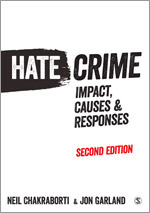Hate Crime
Impact, Causes and Responses
- Neil Chakraborti - University of Leicester, UK
- Jon Garland - University of Surrey, UK
Hate crime is a particularly pernicious form of criminal behaviour that has significant impacts upon victims, their families and wider communities. In this substantially revised and updated edition the book examines the nature, extent and harms of hate crime, and the effectiveness of criminal justice responses to it. It covers racist, religiously motivated, homophobic, disablist and transphobic hate crime, as well as other forms of targeted victimisation such as gendered hostility, elder abuse, attacks upon alternative subcultures and violence against sex workers and the homeless. The book also assesses the complexities and controversies surrounding hate crime legislation and policy-making, as well as the continuing challenges associated with the policing of hate.
The second edition features expanded discussions of international perspectives and contemporary topics such as online hate and cyberbullying, as well as numerous case studies covering issues such as lone wolf extremists, Islamophobia, asylum seekers and the far right. The book contains a range of links to online material that accompany the extensive lists of further reading in each chapter.
In this second edition of Hate Crime, Chakraborti and Garland broaden the scope of their analysis to thoughtfully reflect on dramatic changes in the realms of theory, research and policy that have characterized the field in the intervening 6 years since the first edition. They draw attention to our increased awareness of the complexity and ambiguity of hate crime, challenging readers to question many taken for granted assumptions of previous scholarship. This thoroughly researched and accessible text deftly captures the contexts and consequences of hate crime, giving due consideration to both victims and offenders, as well as the relationships between them. What is especially welcome is the weight given to "ways forward." The authors' emphasis on policy innovations within and beyond the UK will undoubtedly shape the scholarly and practical discourses around how we confront hate crime globally.
Comprehensive, informed, full of ideas, and yet accessible. The completely revised and fully updated second edition of this terrific book, by two of the leading scholars in the field, is an absolute must for anyone interested in the field of hate crimes.
The concept of hate crime has been widely debated by academics but there is unlikely to ever be a broad consensus. However, the realities of the harm it causes to individuals and communities are all too real and UK Governments have recognized the value of decisions having a sound academic foundation. Fortunately there are a core group of academics in the UK who have moved on from the conceptual, to focus on its practicalities. Neil Chakraborti and Jon Garland have contributed greatly to this practical wave of research and this updated volume is a useful step forward, addressing some recent emerging elements of policy and practice.
A very useful read for students or practitioners wanting to expand their understanding of this important area. The text is up-to-date, covering such recent developments as the murder of Lee Rigby and the rise of recent far right street movements. The source material encompasses a wide range of international research but also the impressive work of the two central authors who are clearly leaders in the field... I [recommend] this book to all with an interest in the field who would benefit from an extremely competent and illuminating overview.
This is a fantastic book for helping students to understand the diverse nature of hate crime and will be a key text for helping students to understand the victimisation of a diverse range of demographic groups.
The previous edition of this book is already included on the reading list, so this is an updated version which I intend to recommend.
Great book, which gives you an understanding for hate crimes in a more general perspective.
Although the text is not key to the overall course, it does offer an interesting and informative read for anyone looking at the intricacies of victimology and the links to hate.
This book presents an excellent review of one of the most important areas of Criminology: youth crime. The relation established by this book between the criminological theory and the special characteristics of this type of crime is very interesting. And those chapters related to Criminal Politics and the strategies for its prevention and formal control are even more interesting (and unusual).
This book approaches a new criminal activity, which has been hardly dealt with in current scientific studies: hate crime. In a near future, hate crime will require more and more attention by criminological research. That is why this book is considered as a very useful learning tool for students of this concrete area of Criminology.
- Expanded discussions of international perspectives and contemporary topics e.g. online hate and cyberbullying
- Case studies covering issues such as lone wolf extremists, Islamophobia, asylum seekers and the far right
- Links to online material that accompany the extensive lists of further reading in each chapter.











